In the world of European football, financial power plays a crucial role in determining the success and influence of clubs. As of 2024, the richest football clubs in Europe continue to dominate both on and off the pitch, leveraging their financial muscle to attract top talent and secure lucrative sponsorships.
The valuation of these clubs hinges on several factors, including revenue from broadcasting, commercial activities, and match-day events. Rankings often consider enterprise value, which combines equity and net debt, providing a comprehensive view of a club’s financial standing.
These are the Top 20 Richest Football Clubs in Europe in 2024
1. Real Madrid
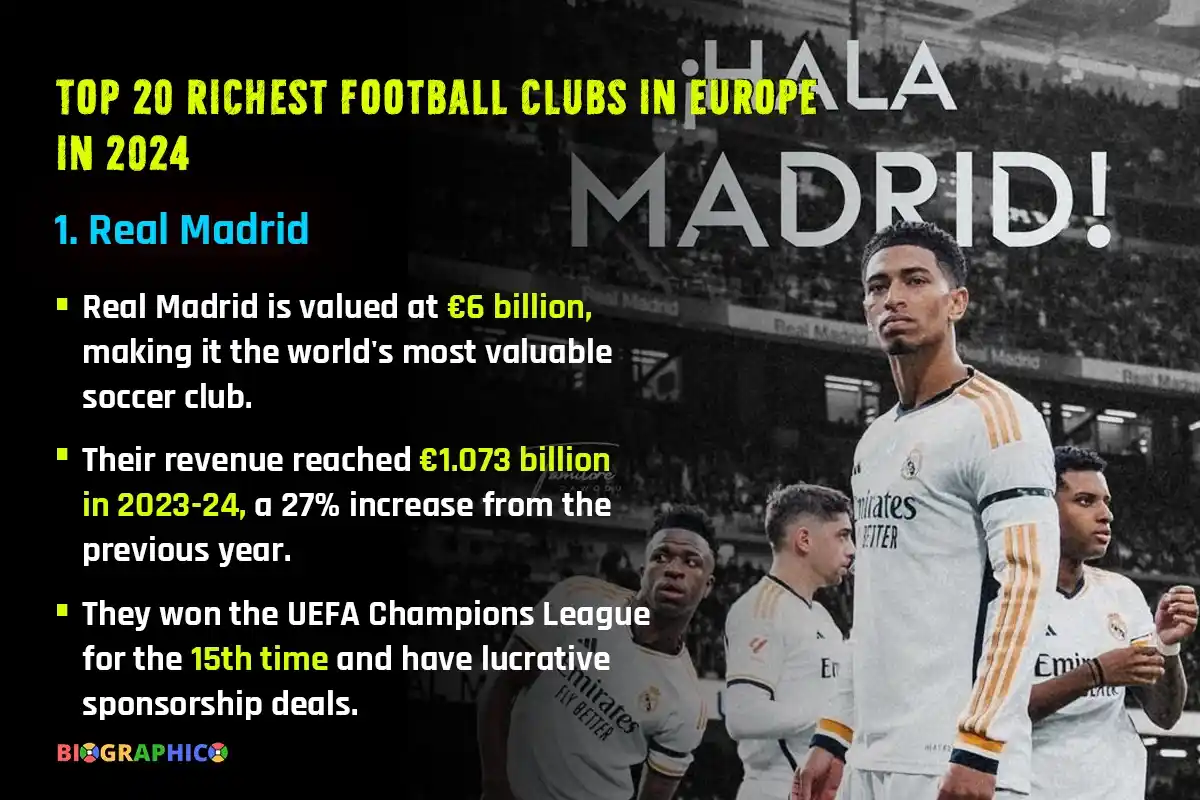
Real Madrid stands as the pinnacle of financial success in European football, boasting a staggering valuation of €6 billion ($6.6 billion) as of 2024, making it the world’s most valuable soccer club. In the 2023-24 season, the club’s revenue soared to €1.073 billion ($1.16 billion), marking a 27% increase from the previous year.
This financial prowess stems from multiple factors, including their consistent success in the UEFA Champions League, where they clinched the title for the 15th time in 2023-2024 season making them the only to win the prestigious title for the highest number of time.
Additionally, strategic sponsorships, such as a lucrative sleeve deal with HP, and enhanced merchandising efforts have significantly increased their income. Despite ongoing renovations at the Santiago Bernabéu Stadium, which have already started to drive increased stadium-related revenues, Real Madrid’s robust financial strategies ensure they remain at the forefront of global football.
2. Manchester United
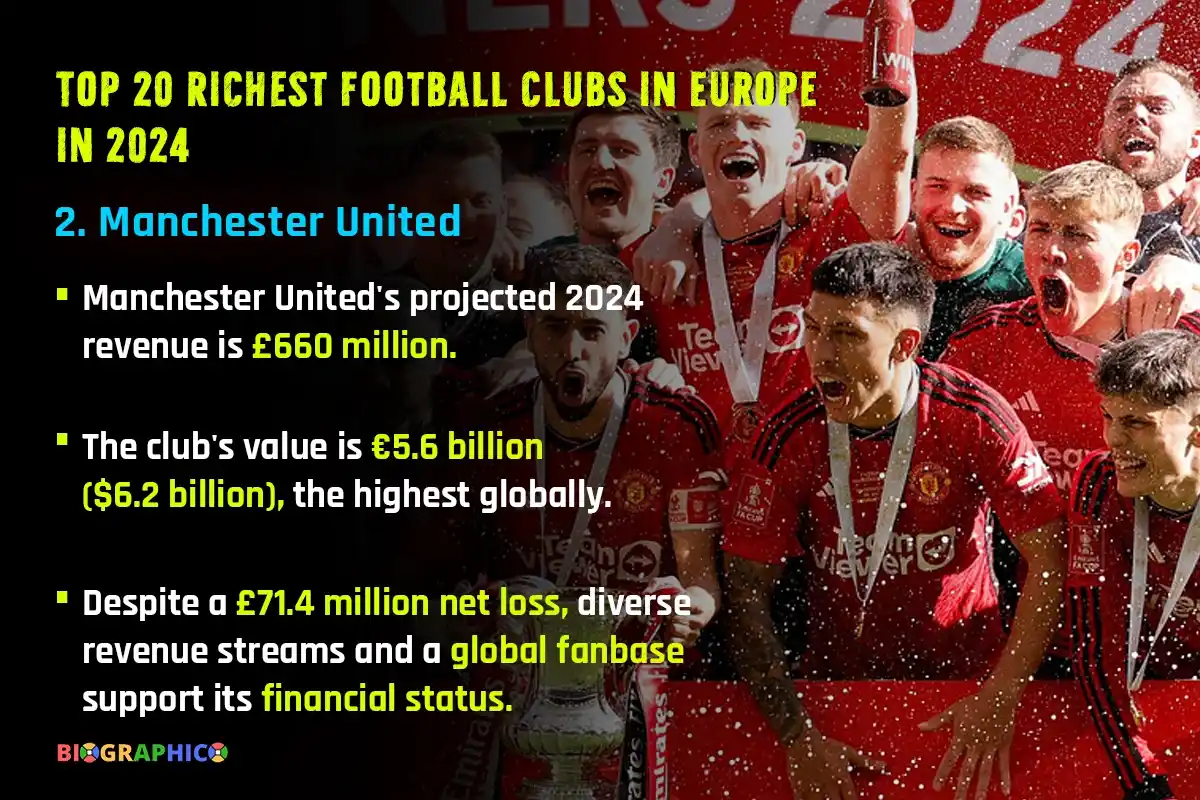
Manchester United continues to be a financial titan in European football, with a projected revenue of £660 million for 2024. The club’s value has reached an impressive €5.6 billion ($6.2 billion), making it the most valuable soccer team globally.
This remarkable valuation comes even as the club navigates significant changes, including British billionaire Jim Ratcliffe acquiring a 27.7% stake.
Despite a reported net loss of £71.4 million in the third quarter, the club’s diverse revenue streams—spanning sponsorships, merchandise, broadcasting, and matchday earnings—remain robust, largely driven by its vast global fanbase of 1.1 billion supporters.
This widespread support ensures continued strong merchandise sales and lucrative sponsorship deals, maintaining United’s top financial status among European football clubs.
3. Barcelona
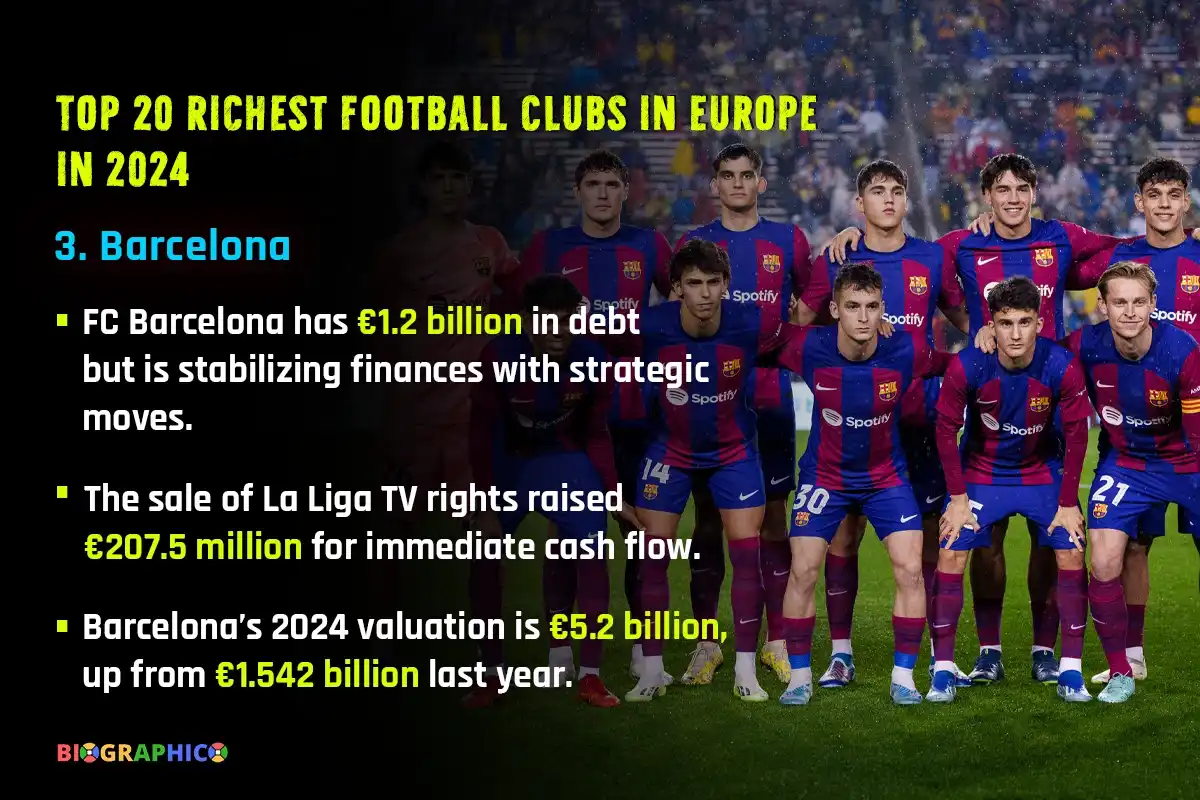
FC Barcelona continues to face significant financial challenges, with debts exceeding €1.2 billion. However, the club is actively pursuing strategies to stabilize its finances while maintaining its status as one of the richest football clubs in Europe.
One of the key initiatives undertaken by the club was the sale of a 10% stake in their La Liga TV rights to Sixth Street, raising €207.5 million. This move was part of a broader strategy to secure immediate cash flow, which also includes plans to increase commercial revenue.
Barcelona aims to generate €378 million during the 2023/24 season from sponsorships and partnerships with major brands such as Nike and Rakuten. A major contributor to Barcelona’s financial resilience is their broadcasting rights, which continue to play a vital role in their revenue generation.
Despite the financial constraints, the club is taking a cautious approach in the transfer market, focusing on player sales and youth development to remain competitive. Regarding the club’s valuation, Barcelona remains a powerhouse in global football.
In 2024, the club’s valuation has soared to an impressive €5.2 billion ($5.6 billion), making it the third most valuable football club in the world. This marks a significant increase from the previous year’s valuation of €1.542 billion, underscoring the effectiveness of their financial strategies despite ongoing challenges.
4. Bayern Munich
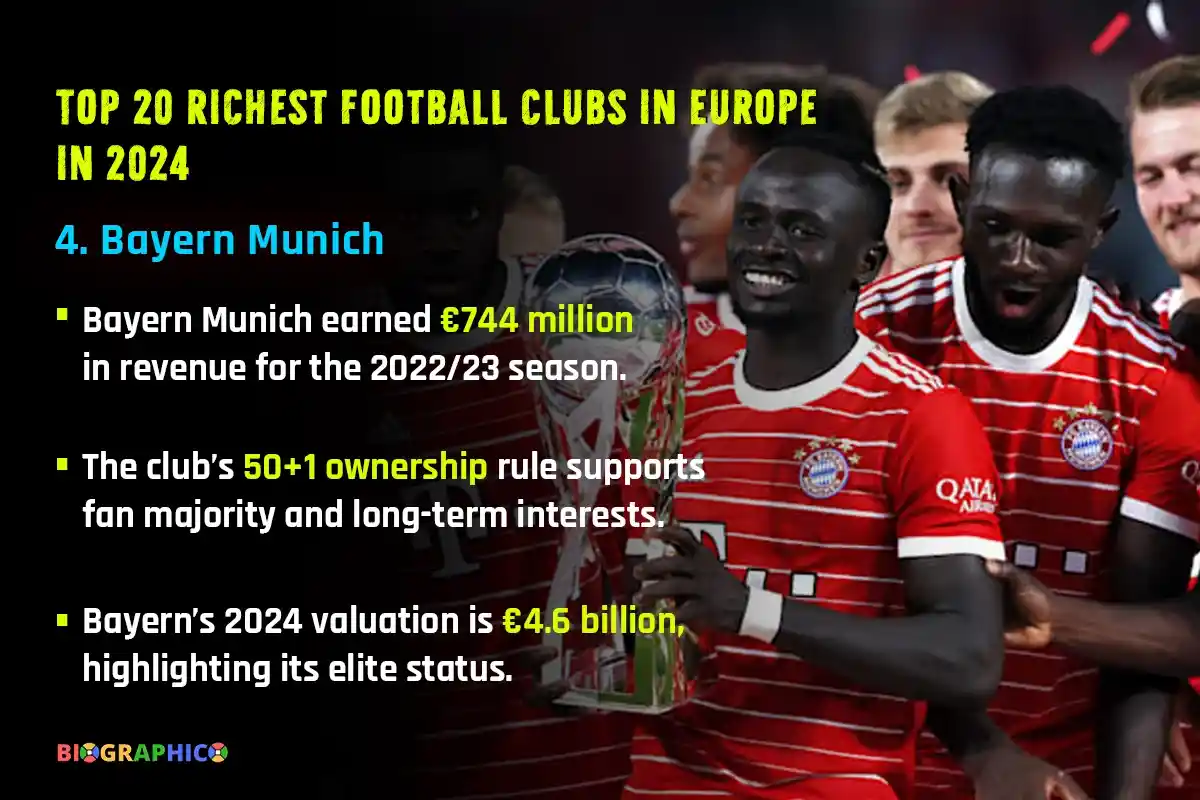
Bayern Munich consistently showcases strong financial performance, highlighted by the club’s impressive revenue generation of €744 million during the 2022/23 season. This financial strength is underpinned by strategic management and a well-diversified revenue stream, with commercial sales alone contributing €419 million.
Such robust financial results reflect the club’s ability to leverage its success on the field and its global brand appeal. A significant aspect of Bayern’s financial stability is the 50+1 ownership rule, which ensures that club members, primarily fans, retain a majority stake in the club.
This model not only fosters a deep sense of community and accountability but also aligns decision-making with long-term interests rather than short-term profits.
In 2024, Bayern Munich’s valuation stands at an impressive €4.6 billion ($5 billion), solidifying its position as one of the wealthiest football clubs in Europe. This valuation is a testament to the club’s successful blend of commercial acumen and fan engagement, allowing Bayern Munich to maintain its elite status both on and off the field.
5. Liverpool
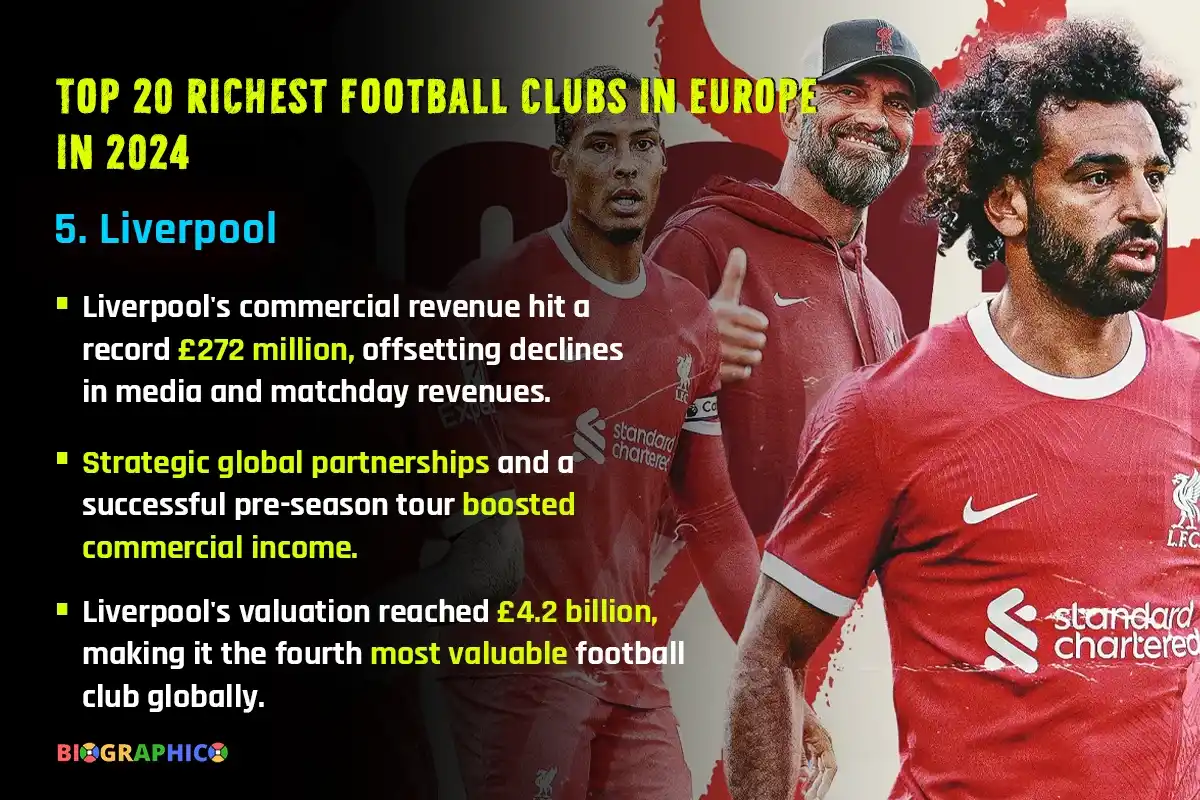
Liverpool FC has seen remarkable financial growth, driven primarily by an impressive surge in commercial revenue. As of the 2023-24 season, the club’s commercial income reached a record-breaking £272 million, making it the largest revenue stream for the club.
This increase in commercial revenue has been crucial in offsetting declines in both media and matchday revenues, which dropped to £242 million and £80 million, respectively. The boost in commercial income can be attributed to strategic partnerships with major global brands such as Peloton, UPS, and Google Pixel, alongside a highly successful pre-season tour in Asia.
These initiatives have significantly bolstered Liverpool’s financial standing, helping the club maintain its competitive edge. On the field, Liverpool’s performance in domestic and European competitions has further enhanced its global appeal, leading to more sponsorship deals and higher merchandise sales.
This commercial success is reflected in Liverpool’s overall valuation, which has reached an estimated £4.2 billion ($5.29 billion) as of 2024, according to Forbes. This valuation places Liverpool as the fourth most valuable football club in the world, only behind Real Madrid, Manchester United, and Barcelona.
Despite missing out on the Champions League in the previous season, Liverpool remains a top contender in the Premier League, which continues to solidify its position among the richest football clubs in Europe. The club’s valuation and financial strategies underscore its resilience and ability to thrive both on and off the pitch.
6. Manchester City
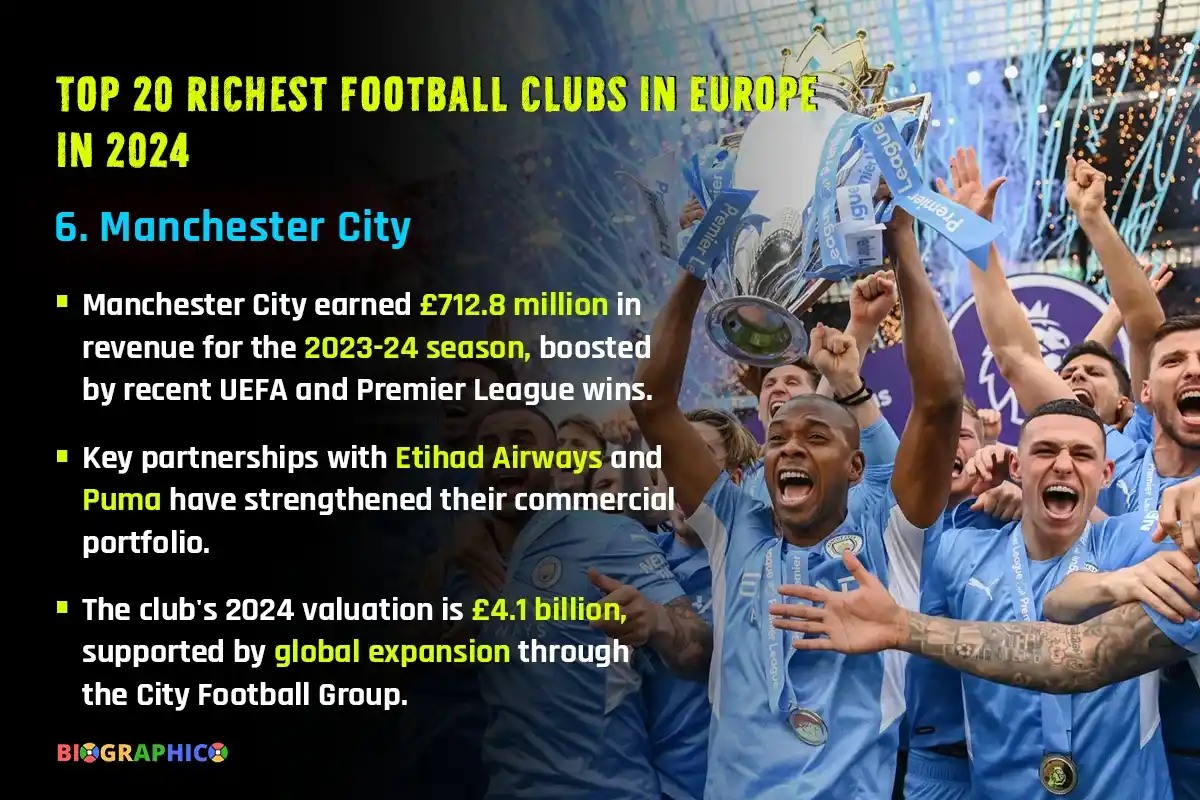
Manchester City has solidified its position as one of Europe’s wealthiest football clubs, reporting an impressive revenue of £712.8 million for the 2023-24 season. This financial achievement is closely tied to their recent successes in the UEFA Champions League and the Premier League, which have significantly enhanced both their broadcast and commercial revenue streams.
Key partnerships with global giants like Etihad Airways and Puma have further bolstered their financial strength, contributing to their robust commercial portfolio. The club’s valuation in 2024 stands at an astonishing £4.1 billion ($4.5 billion), underscoring its stature in the football world.
The strategic influence of the City Football Group, under the leadership of Sheikh Mansour, plays a critical role in Manchester City’s financial planning and success. The group’s approach includes expanding its global football network by acquiring stakes in clubs around the world. This strategy not only diversifies their revenue streams but also amplifies Manchester City’s brand on the global stage, ensuring ongoing financial growth and long-term stability.
With this combination of on-field success and astute financial management, Manchester City continues to lead the way in both sports and business.
7. Paris-Saint Germain (PSG)
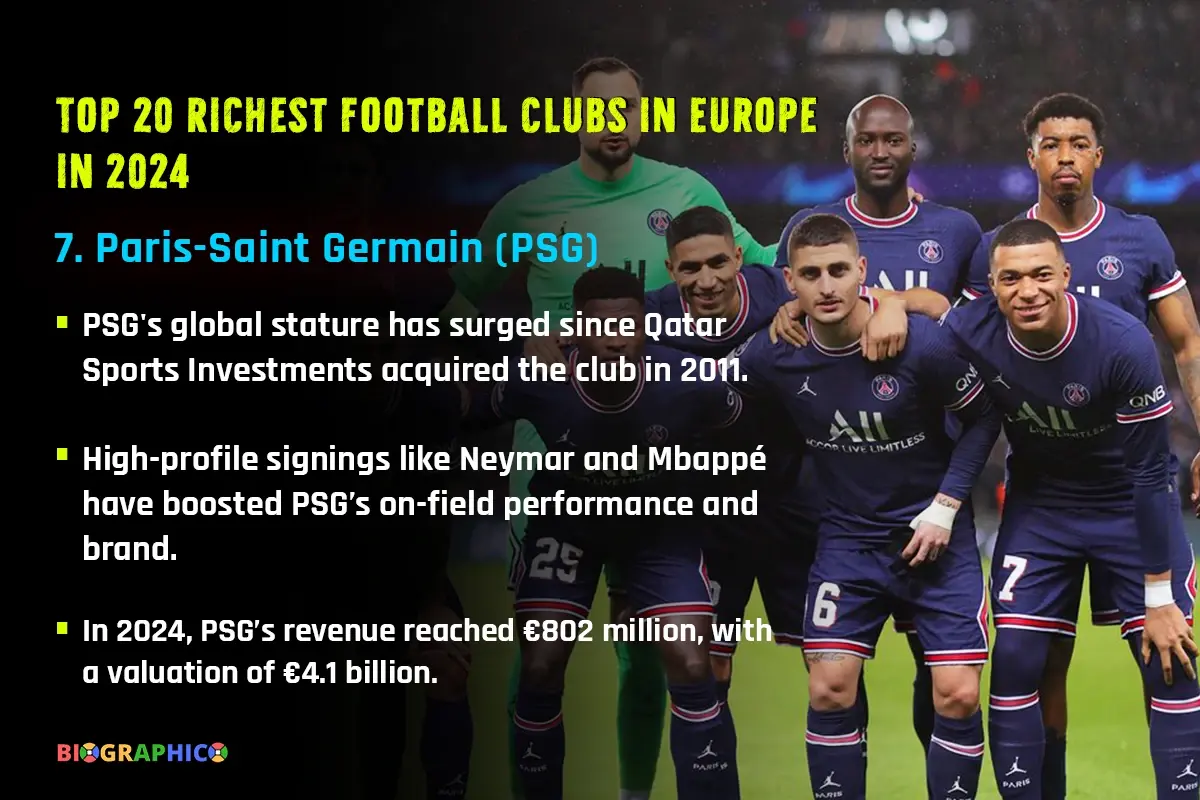
Paris Saint-Germain (PSG) has emerged as a global football powerhouse, driven by the strategic influence of its Qatari ownership. Since Qatar Sports Investments (QSI) acquired the club in 2011, PSG has benefitted from substantial financial backing, enabling it to secure high-profile signings like Neymar and Kylian Mbappé.
These acquisitions have not only elevated the team’s on-field performance but also significantly boosted its global brand recognition. By 2024, PSG’s financial prowess is evident, with the club generating €802 million in annual earnings, a record that underscores its dominant commercial success.
This revenue surge has been bolstered by lucrative sponsorship deals with major brands like Nike, Qatar Airways, and Accor, which have expanded PSG’s reach beyond France, solidifying its status as one of Europe’s wealthiest football clubs.
Moreover, the club’s valuation in 2024 stands at an impressive €4.1 billion ($4.5 billion), placing PSG among the elite in global football. This valuation reflects the club’s consistent growth under QSI’s stewardship, where strategic investments in star players and global marketing initiatives continue to drive PSG’s financial growth and influence in the football world.
8. Tottenham Hotspur
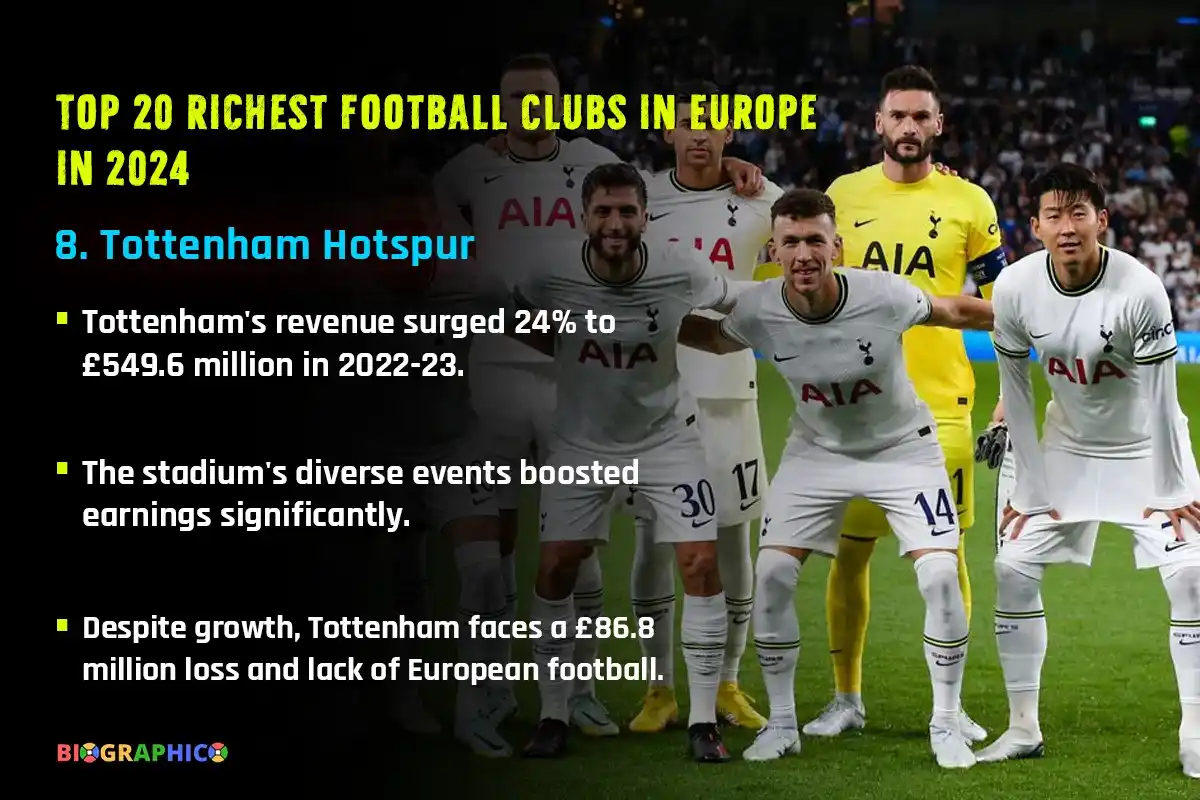
Tottenham Hotspur has witnessed remarkable financial growth, with total revenue soaring to £549.6 million for the 2022-23 season, representing a 24% increase from the previous year. This impressive growth is largely attributed to the Tottenham Hotspur Stadium, which has evolved into a significant revenue generator.
The stadium not only brings in substantial matchday receipts but also hosts a variety of non-football events, including concerts and NFL games, further boosting the club’s earnings. The club’s commercial revenue also experienced a notable rise, bolstered by strategic partnerships with prominent brands like AIA and Nike.
These sponsorship deals have played a crucial role in enhancing the club’s financial profile. However, despite these revenue gains, Tottenham Hotspur faces challenges in sustaining its financial status.
✨ 𝙊𝙝 𝙬𝙝𝙖𝙩 𝙖 𝙣𝙞𝙜𝙝𝙩 ✨
🗓️ Two years ago today#THFC ⚪️ #COYS pic.twitter.com/C1C8kD2Op1
— Tottenham Hotspur (@SpursOfficial) May 8, 2021The club reported a loss of £86.8 million, which was partly driven by increased operating expenses. Additionally, the absence of European football for the current season poses a significant financial hurdle, potentially affecting the club’s revenue streams.
In response to these challenges, ongoing discussions with prospective investors aim to strengthen the club’s equity base. These efforts are geared towards providing opportunities for future growth and further investment in the team, ensuring that Tottenham can remain competitive both on and off the pitch.
As of 2024, Tottenham Hotspur’s valuation stands at an impressive £2.6 billion ($2.8 billion). This valuation reflects the club’s growing stature in the world of football and underscores the potential for future success, provided that they can navigate the financial and sporting challenges ahead.
9. Chelsea
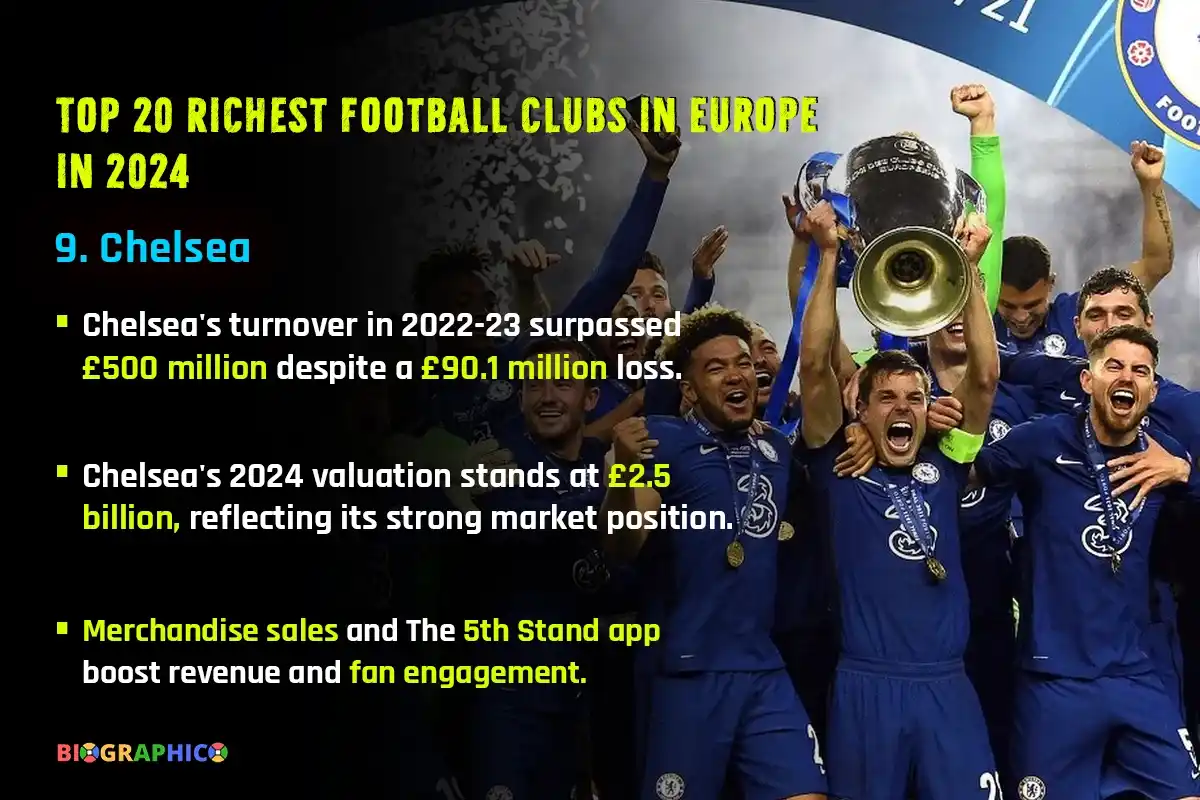
Chelsea Football Club continues to navigate a complex financial landscape, marked by recent investments and strategic restructuring under the ownership of Todd Boehly and Clearlake Capital. For the 2022-23 season, Chelsea’s turnover surpassed £500 million for the first time, driven by increased matchday and commercial revenues.
However, the club also reported a loss of £90.1 million, reflecting the challenges of maintaining financial stability amidst high operational costs and the lingering effects of previous sanctions. Despite these challenges, Chelsea’s valuation in 2024 stands at an impressive £2.5 billion ($3.1 billion), underscoring its significant market value and position in global football.
Merchandise sales and a robust global fanbase significantly contribute to Chelsea’s revenue. The club’s strategic use of The 5th Stand app enhances fan engagement worldwide, further boosting merchandise sales.
This digital platform connects Chelsea’s extensive fanbase, ensuring sustained commercial growth and reinforcing the club’s position among the richest football clubs in Europe. The club’s ability to maintain a high valuation, despite financial challenges, is a testament to its strong brand, loyal fanbase, and strategic commercial initiatives under new ownership.
10. Arsenal
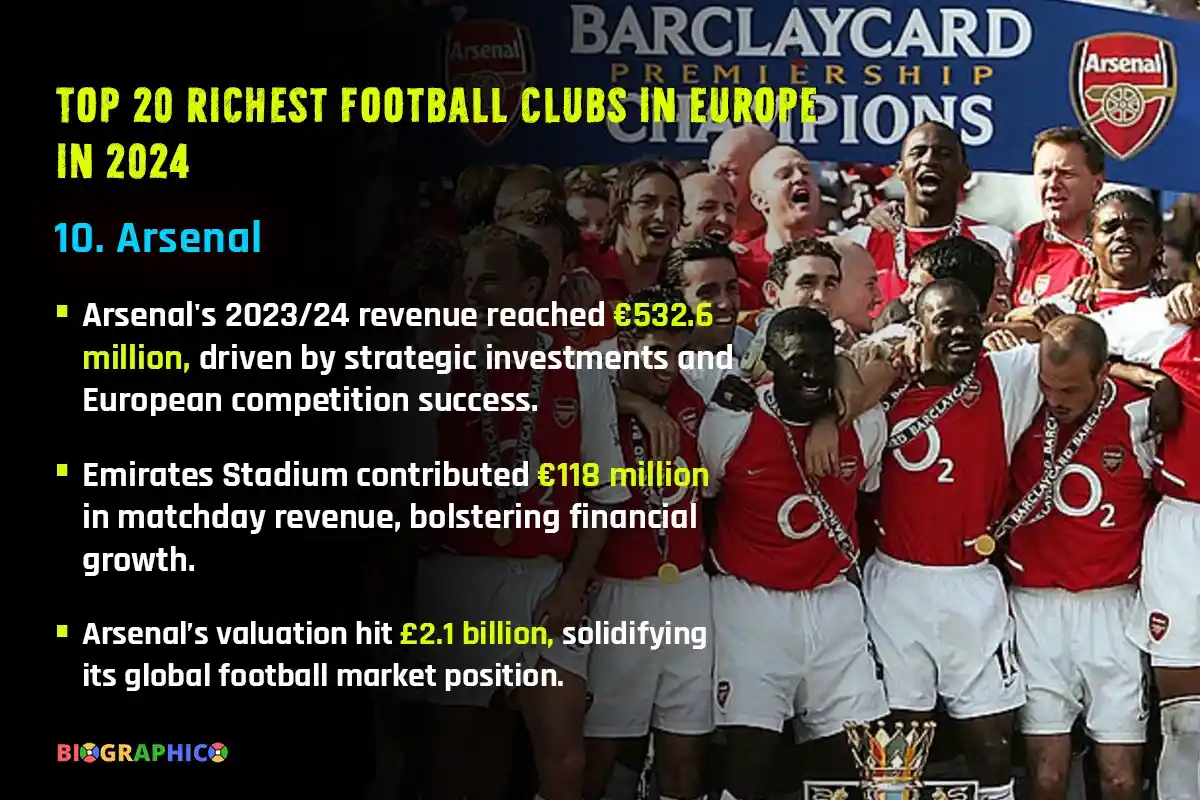
Arsenal has strategically enhanced its financial position, achieving a remarkable revenue of €532.6 million for the 2023/24 season. This growth follows significant investments from Kroenke Sports & Entertainment, which have supported the club’s ambitions to return to a self-sustaining financial model.
The Emirates Stadium continues to be a vital source of matchday revenue, contributing €118 million to the overall income. Participation in European competitions has notably impacted Arsenal’s finances, with the club’s return to the Champions League increasing broadcast revenue to €220 million.
This highlights the importance of European success to the club’s financial health. Arsenal’s financial boost allows them to invest in talent and infrastructure, reinforcing their status among the richest football clubs in Europe.
As of 2024, Arsenal’s valuation stands at £2.1 billion ($2.6 billion), reflecting the club’s strong financial performance and strategic investments under the stewardship of Kroenke Sports & Entertainment. This valuation solidifies Arsenal’s position as a major player in the global football market.
11. Juventus
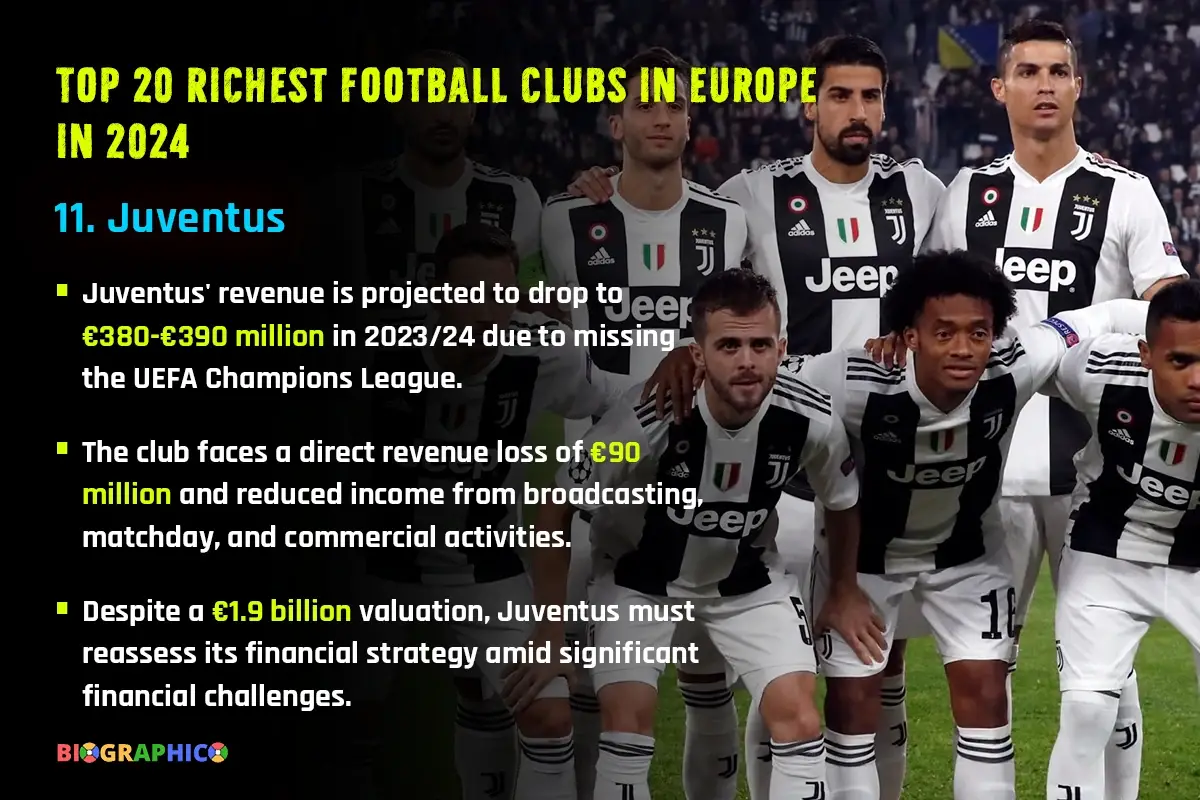
Juventus is currently navigating through significant financial difficulties, with the club’s revenue projected to decline to between €380 million and €390 million for the 2023/24 season. This represents a sharp drop from previous years, primarily due to their absence from the UEFA Champions League. The failure to qualify for this prestigious tournament has resulted in a direct revenue loss of approximately €90 million.
The impact of missing out on European competitions is far-reaching, affecting not only broadcasting revenue but also matchday income and commercial opportunities. Without the exposure and financial benefits that come with Champions League participation, Juventus has had to reassess its financial strategy.
Moreover, as of 2024, Juventus’ valuation stands at €1.9 billion ($2.05 billion). While this valuation reflects the club’s historical significance and brand value, the financial challenges they face indicate a need for careful management and strategic decisions to navigate through this period of reduced income.
These financial strains underscore the importance of success on the pitch, as participation in top-tier European competitions is crucial for maintaining financial stability and sustaining the club’s valuation in the competitive world of football.
12. Borussia Dortmund
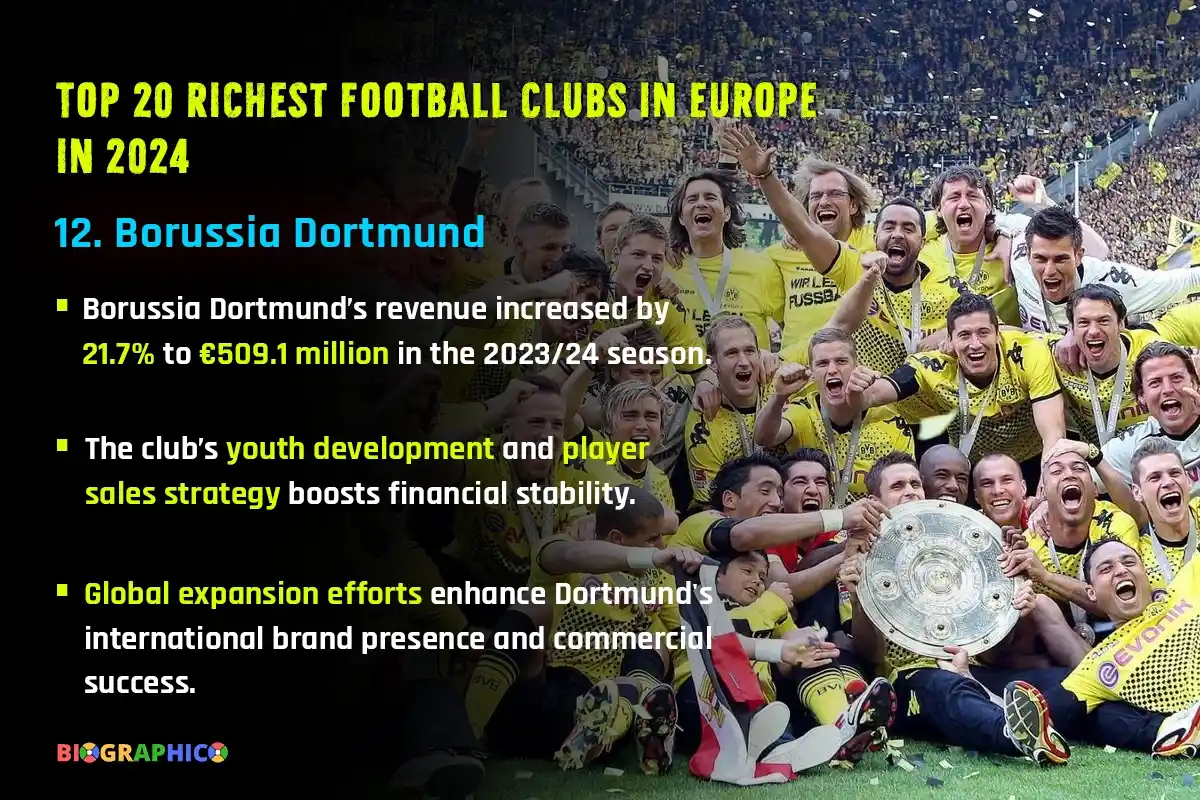
Borussia Dortmund has effectively utilized a strategy centered around player sales and youth development to strengthen its financial standing. The club’s renowned youth academy has been instrumental in producing top talents like Jadon Sancho and Erling Haaland, whose high-profile transfers have generated substantial profits.
This approach not only contributes to financial stability but also bolsters Dortmund’s reputation as a premier destination for nurturing young players.
In the 2023/24 season, Borussia Dortmund reported a significant increase in consolidated revenue, rising by 21.7% to €509.1 million. This financial success was largely driven by strategic sponsorships, matchday revenues, and the club’s strong fan base, exemplified by the iconic “Yellow Wall” at Signal Iduna Park. The vibrant atmosphere at the stadium continues to contribute to high matchday attendance, enhancing the overall fan experience.
Moreover, Borussia Dortmund’s global expansion efforts, including the establishment of offices in New York, China, and Singapore, are aimed at increasing the club’s international brand presence and securing lucrative commercial deals. These initiatives are key to ensuring the club’s continued growth and competitiveness on the global stage.
As of 2024, Borussia Dortmund’s valuation stands at approximately €1.8 billion ($1.975 billion). This impressive valuation reflects the club’s successful financial strategies and its status as one of the most valuable football clubs in the world.
13. Atletico Madrid
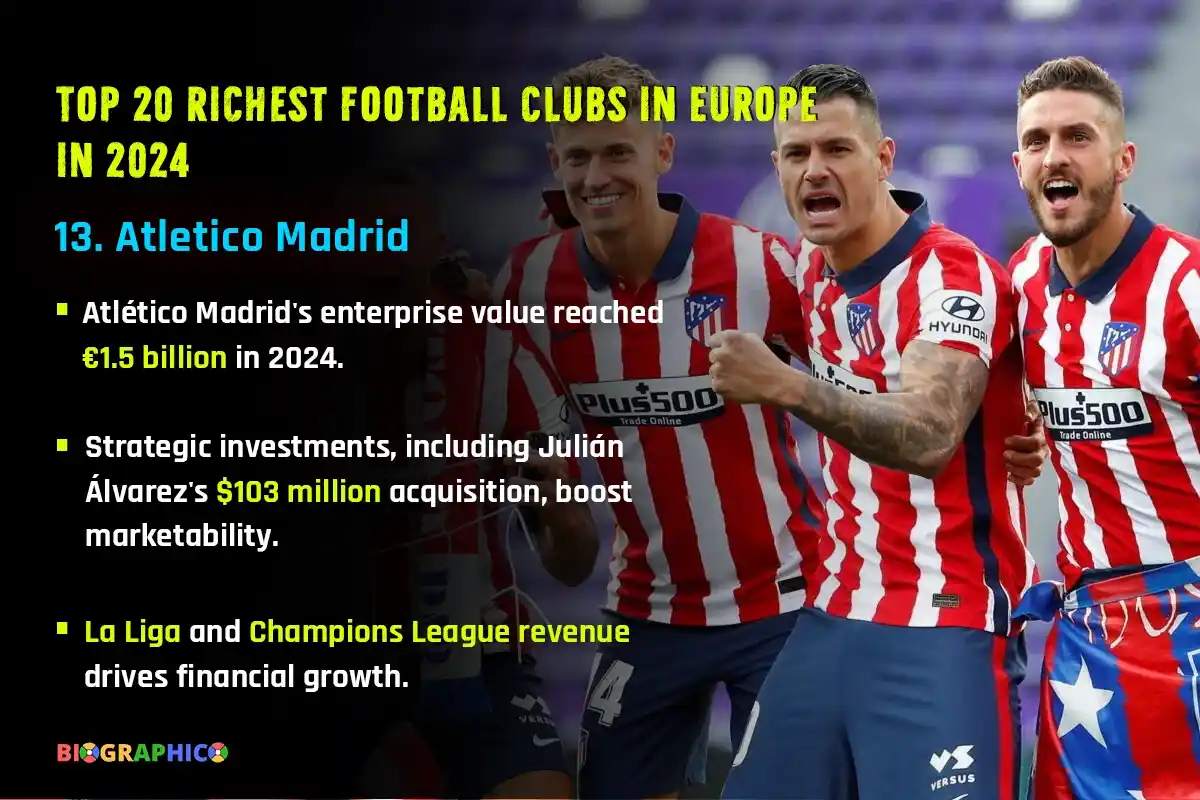
Atlético Madrid’s financial growth has been impressive, with an enterprise value reaching €1.5 billion ($1.6 billion) as of 2024. This growth is fueled by strategic investments, including the recent acquisition of Argentine striker Julián Álvarez from Manchester City for over $103 million.
Such high-profile signings enhance the club’s competitive edge and marketability.
Revenue from domestic and international competitions plays a crucial role in Atlético’s financial standing. The club’s consistent performances in La Liga and the UEFA Champions League contribute significantly to broadcasting and matchday income.
These revenue streams, combined with smart investments and player acquisitions, ensure Atlético Madrid maintains its position among the richest football clubs in Europe.
14. AC Milan
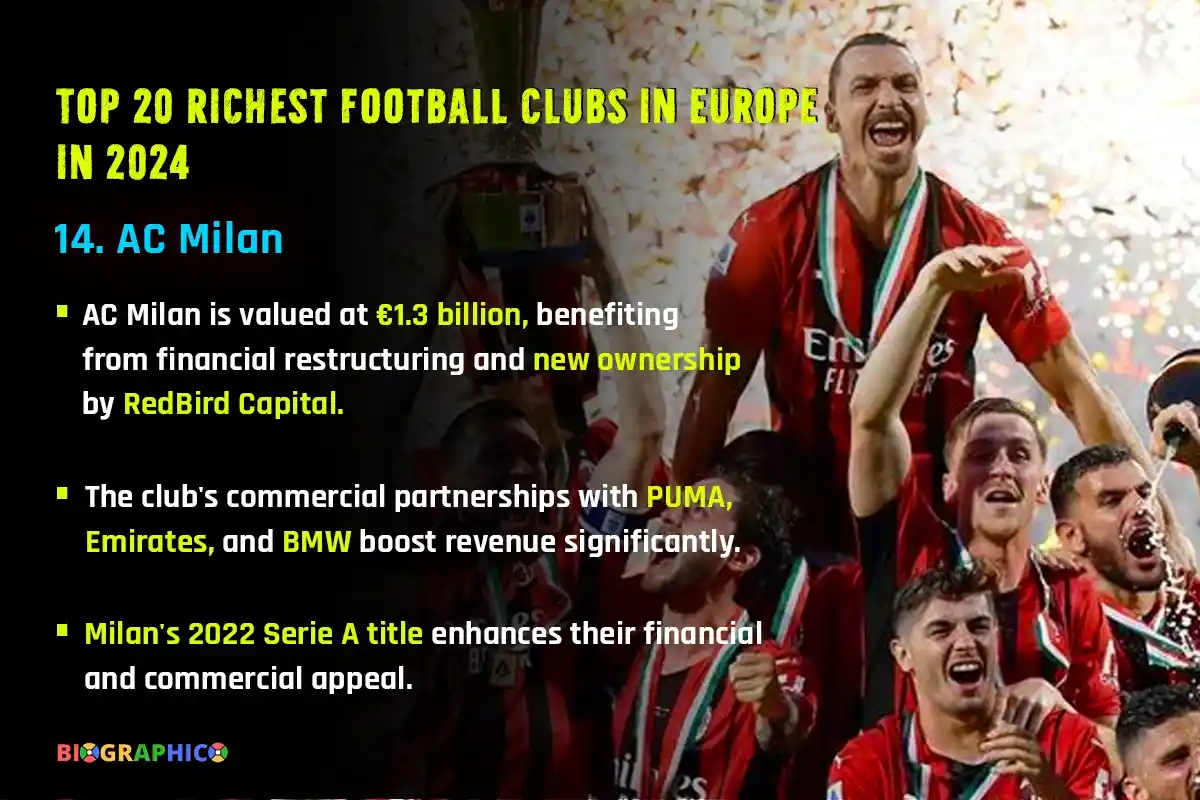
AC Milan stands as one of the richest football clubs in Europe, boasting a valuation of €1.3 billion ($1.4 billion) as of 2024. The Italian giants have undergone significant financial restructuring in recent years, which has positively impacted their performance both on and off the pitch.
You’ll find AC Milan’s resurgence closely tied to their new ownership. RedBird Capital Partners acquired the club in 2022, injecting fresh capital and implementing a sustainable business model. This change has allowed Milan to invest in top talent while maintaining financial stability.
The Rossoneri have leveraged their iconic brand to secure lucrative commercial partnerships. Their deals with PUMA, Emirates, and BMW have boosted revenues substantially. These partnerships, combined with a global fanbase of over 500 million supporters, contribute significantly to Milan’s financial strength.
Milan’s recent on-field success, including their 2022 Serie A title, has further enhanced their commercial appeal. You can expect the club to continue growing financially as they compete at the highest levels of European football.
15. West Ham United
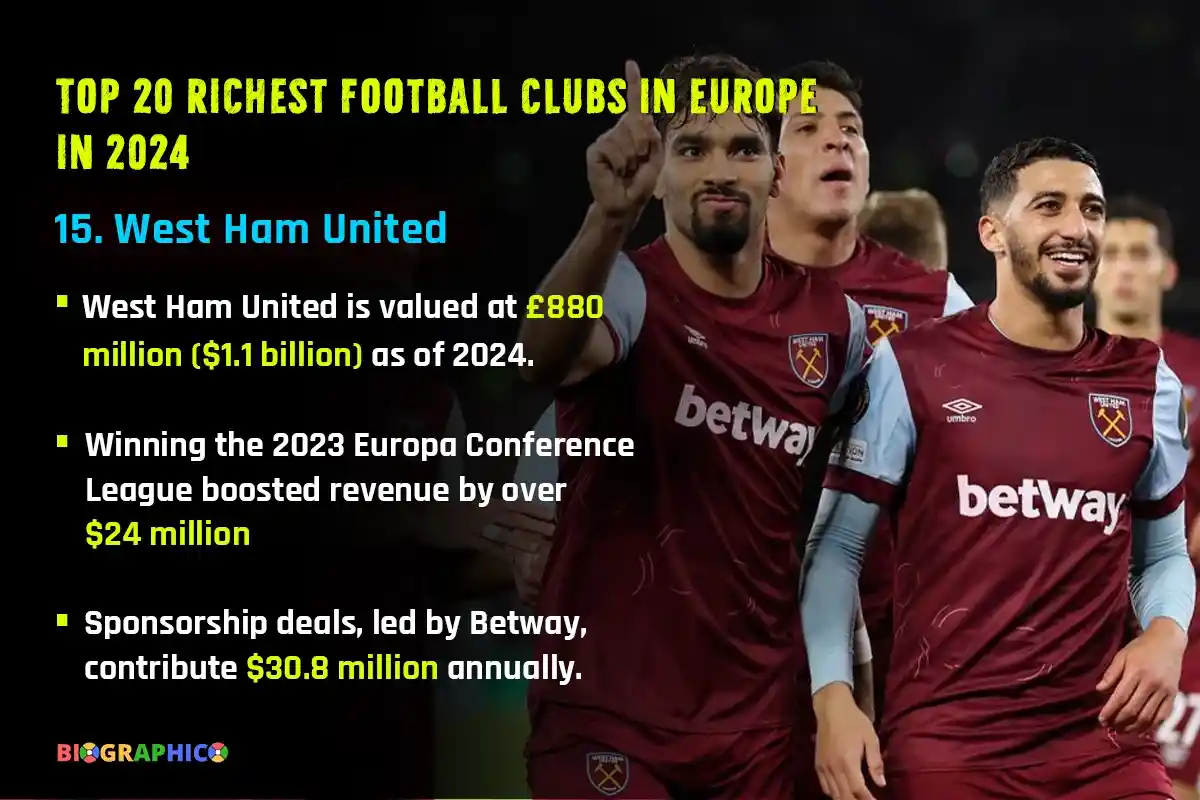
West Ham United, one of the richest football clubs in Europe, holds a valuation of approximately £880 million ($1.1 billion) as of 2024. The club has experienced financial growth, primarily due to their recent performances on the European stage.
Winning the Europa Conference League in 2023 marked their first major trophy in 43 years, significantly boosting their revenue by over $24 million.
The club’s financial growth also stems from revenue generated through their stadium and sponsorship deals. The London Stadium, with a capacity of 60,000, provides substantial matchday income.
Additionally, West Ham’s sponsorship deals for the 2023/24 season totaled over $30.8 million, with Betway being the largest contributor at $12.65 million annually. These financial strategies have played a crucial role in maintaining West Ham’s strong economic position.
16. Inter Milan
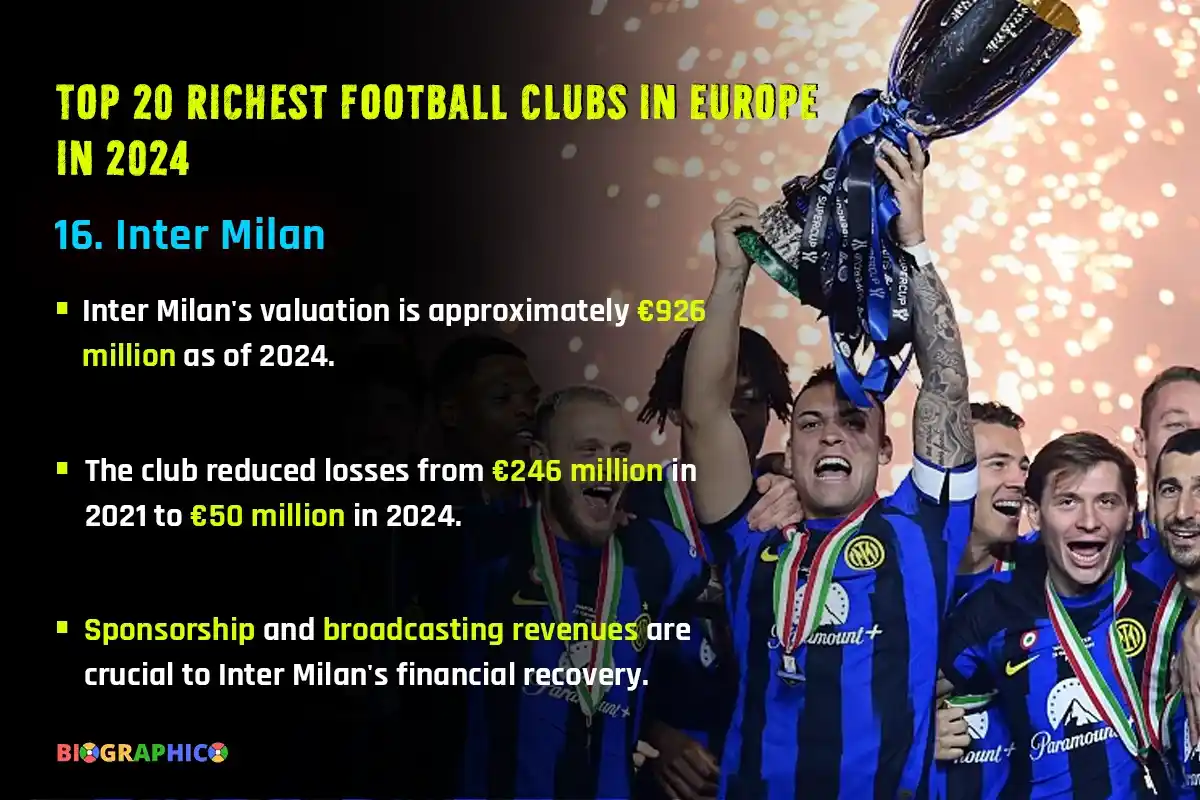
Inter Milan ranks among the richest football clubs in Europe, with a valuation of approximately €926 million ($1 billion) as of 2024. Despite facing financial challenges in recent years, the club has implemented effective recovery strategies.
Inter reduced their losses from €246 million in 2021 to an estimated €50 million in 2024, thanks to cost-cutting measures and improved financial management.
Sponsorship and broadcasting revenues play a crucial role in Inter’s financial recovery. The club secured €72 million from sponsorship deals for the 2024/25 season, including a lucrative agreement with Betsson, which significantly boosted their shirt sponsorship income.
Additionally, Inter’s broadcast revenues have increased, particularly from UEFA competitions, due to improved performances and higher historical coefficient rankings. These financial strategies and revenue streams have helped stabilize Inter Milan’s economic standing.
17. Aston Villa

Aston Villa Football Club, based in Birmingham, England, is a historic team in the English Premier League. As of 2024, Aston Villa is valued at approximately £640 million ($800 million). This valuation reflects the club’s financial health, market position, and brand strength within the global soccer landscape.
Aston Villa’s revenue primarily comes from broadcasting rights, sponsorships, and matchday revenue. Broadcasting deals, especially those tied to the Premier League, provide a substantial portion of the club’s income. Sponsorships, including kit deals and other commercial partnerships, further bolster their financial position. Matchday revenue, through ticket sales, hospitality, and merchandise, also plays a significant role.
In the 2023-2024 season, Aston Villa’s performance on the field has had a direct impact on their financial health. Success in domestic and European competitions has enhanced their visibility and attractiveness to sponsors, positively influencing their revenue and overall valuation.
18. New Castle United
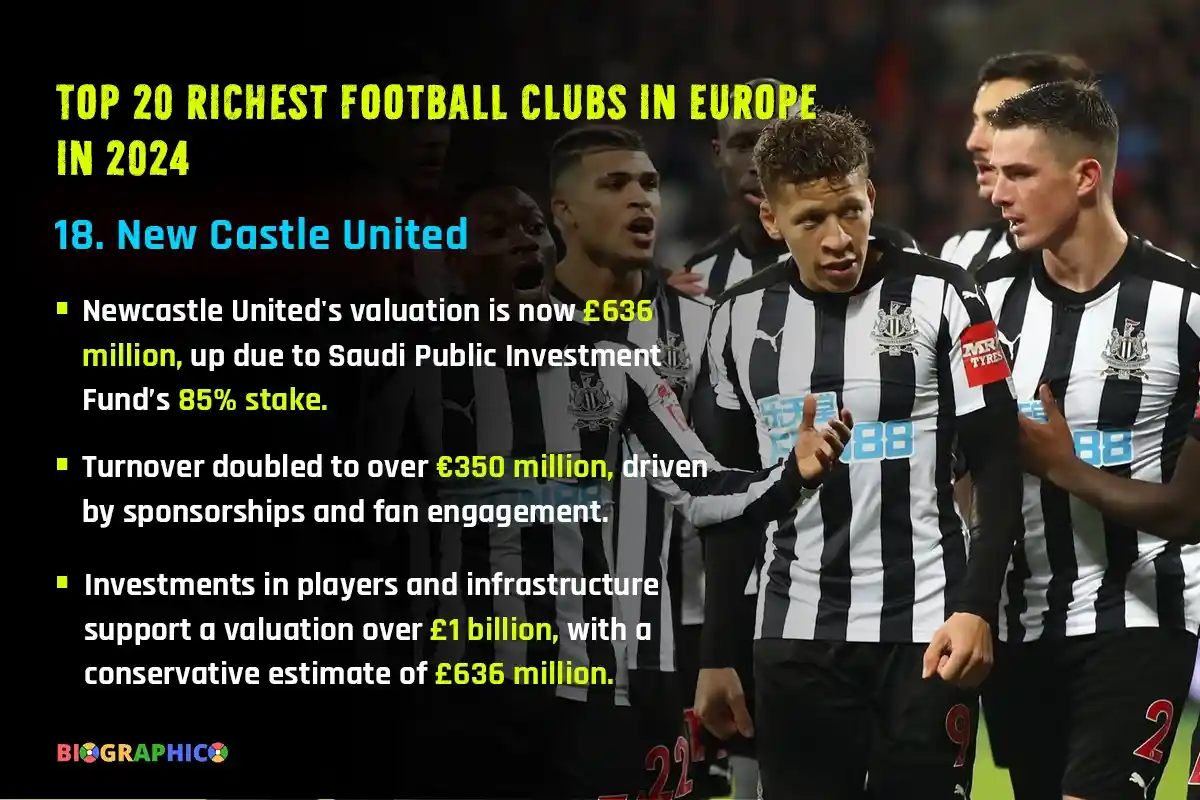
Newcastle United’s valuation in 2024 stands at £636 million ($795 million), marking a significant shift in the club’s financial landscape following its acquisition by the Saudi Public Investment Fund (PIF). PIF now holds an 85% stake in the club, which has not only boosted its market value but also transformed its financial capabilities.
The new ownership has enabled Newcastle to double its turnover, surpassing €350 million in the last financial year, primarily due to strategic sponsorships and enhanced fan engagement. This financial boost has been crucial for the club’s ambitions, allowing them to compete more vigorously in the Premier League and aim for consistent participation in European competitions.
The PIF’s involvement has also led to significant investments in player acquisitions and infrastructure, contributing to a valuation exceeding £1 billion according to some reports. However, the adjusted valuation of £636 million reflects a more conservative estimate that still underscores the dramatic impact of the new financial strategies on the club’s standing.
This strategic and financial overhaul positions Newcastle United for sustainable growth, with a strong focus on building its brand and expanding revenue streams, ensuring long-term success both on and off the pitch.
19. Fulham FC
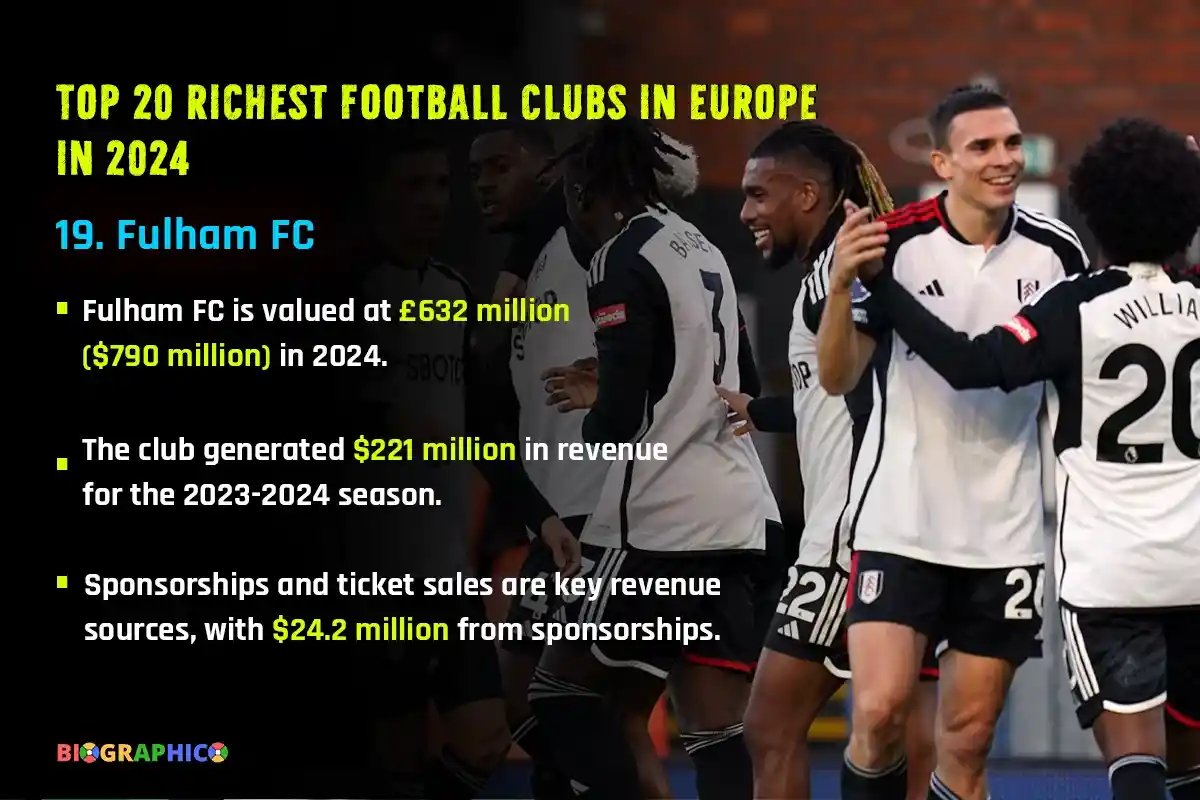
Fulham Football Club, based in West London, is a prominent team in the English Premier League, valued at approximately £632 million ($790 million) as of 2024. This valuation underscores the club’s strong financial health and stature in professional football.
Fulham’s revenue comes from various streams, including sponsorships, ticket sales, and broadcasting rights. In the 2023-2024 season, the club generated $221 million in total revenue.
Sponsorships contributed significantly, with $24.2 million earned, including $12.5 million from their main sponsor, SBOTOP. The club also benefits from partnerships with 29 brands, including Adidas and World Mobile.
Ticket sales from Craven Cottage and broadcasting rights further bolster the club’s income. The team’s performance in the Premier League plays a critical role in maintaining and enhancing its revenue streams and overall valuation.
20. Crystal Palace
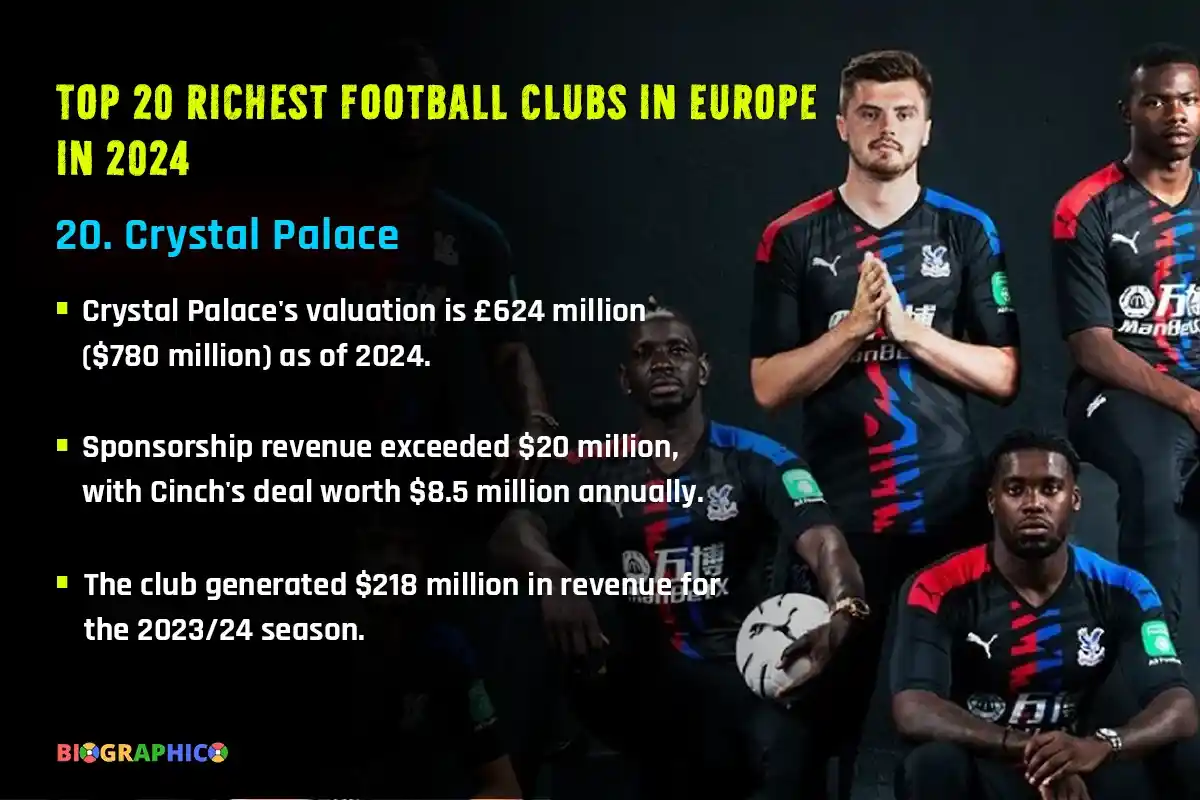
Crystal Palace Football Club, based in South London, is a notable team in the English Premier League, valued at £624 million ($780 million) as of 2024. This valuation underscores their significant financial health and market presence within the league.
The club’s revenue streams are diverse, with major contributions from sponsorships, ticket sales, and broadcasting rights. In the 2023/24 season, Crystal Palace’s total sponsorship revenue exceeded $20 million, with the largest single deal being with Cinch, valued at $8.5 million annually.
Other key sponsors include Macron, Kaiyun Sports, iPro Sport, and Socios.com, all of which are integral to the club’s financial growth. For the 2023-2024 season, Crystal Palace generated approximately $218 million in revenue, highlighting their ability to effectively monetize their brand.
Their top-10 finish in the Premier League during this season further bolstered their revenue potential, enhancing ticket sales, merchandise sales, and sponsorship attractiveness. However, player transfers, such as the sale of Michael Olise to Bayern Munich, can impact team dynamics and future performance, influencing financial outcomes.
Wrapping Up
In conclusion, the financial landscape of European football clubs in 2024 is characterized by continued growth and increasing valuations, despite lingering challenges from the COVID-19 pandemic.
The top 20 richest clubs, led by Real Madrid, Barcelona, and Manchester United, have maintained their dominance through strong revenue streams, lucrative sponsorship deals, and strategic financial management. Looking ahead, club valuations are expected to rise further as the global appeal of football continues to expand.
Clubs will likely focus on diversifying revenue sources, investing in youth development, and leveraging data analytics to optimize player recruitment and financial decision-making. Financial fair play regulations will also play a crucial role in promoting sustainability and curbing excessive spending.


![[Updated] Tilak Mehta's Net Worth in 2024 is in Millions! 33 Tilak Mehta's net worth](https://biographico.site/wp-content/uploads/2024/08/Tilak-Mehtas-net-worth.webp)



